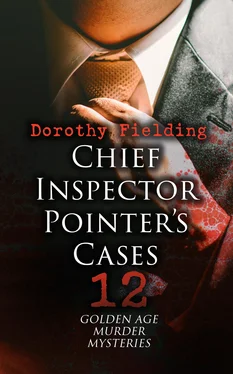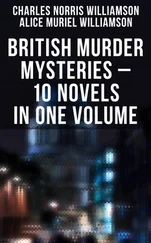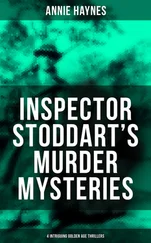"But he might leave them in some downstairs room, tied up, labelled, and ready to be sent back."
Rodman nodded. He thought that the chief constable might very easily have done that.
"But," Harris tried to keep his head above water, "they were only letters, except that note I shoved in, only Miss Rose's letters—".
"Just so," Pointer said briskly. "Letters. Possibly some one thought that that missing enclosure the professor sent his daughter, and which no one seems able to trace, might be there too."
"You thought that flake of sealing-wax on the table at the studio meant it had been there. Perhaps she had handed it over to some one, Mr. Bellairs, say."
"Possibly. I've written to him to ask for a full account of how he spent Thursday night, from eight onwards. But that flake was on a little table by the door, you know, not on the central table. It looks to me more as though the black-sealed envelope had been merely laid down on the small table to be out of the way."
"Pity one can't just ask the professor what the letter, and second, inside envelope, is all about," Harris said.
"The colonel is inserting an advertisement in all the Italian, French, and Balkan newspapers addressed to his brother-in-law, and asking him to return immediately. That ought to reach him soon, wherever he is." And with that, Pointer left his two helpers and began to look through the reports that had been sent down by a motor cyclist from Scotland Yard.
He learnt that no hospital had taken in any case on Thursday night that could possibly be connected with the man he wanted. Private nursing-homes were being investigated, but they would take time, as all inquiries were to be so carefully made. A list was furnished the Chief Inspector of all the doctors and surgeons who attended the French hospital in Soho. One of these, Pointer noted, had a nursing-home in a smart part of the West end. He was Sir Martin Martineau. In accordance with his instructions, very special inquiries had been made there, but they had led to nothing.
Pointer filed the notes and went out for a stroll. The stroll took him to Doctor Metcalfe's. But that young man's flood of gossip had nothing in it which threw any new light on the facts of the case, and Pointer decided finally that perhaps sleep was not a mere luxury, even in the beginning of a case, and, following Harris's example, was soon himself tucked up in a room of the superintendent's. For Brown had taken his departure from Red Gates before the inquest.
Next morning he was early up at Stillwater House for a chat with Paul, who liked him.
"Nothing has been changed, I suppose?" Pointer asked, following him into the deserted dining-room.
"No, sir. Funeral's at three," Paul said sadly. "Hasn't been a funeral of anybody under sixty from this house since I've been in service here. And me having been born on the estate can be relied on for facts. And to think of its being our Miss Rose now. It still don't seem real sometimes."
"Ladies going?" asked Pointer.
Paul said they were.
"With whom is Mrs. Lane driving?" Pointer asked again.
"With Miss Sibella. At least—well—that had been so arranged, but they've had a little—ahem, ladies will be ladies," Paul finished obscurely.
"Trouble, eh?" Pointer offered him a cigar. "Mrs. Lane looks to me as if she had a bit of a temper."
Paul eyed him in mild amazement.
"Then I should try glasses, sir," he said finally. "Mrs. Lane's as gentle a creature as ever stepped. Now, Miss Sibella—"
"What was the trouble between the ladies about?"
"I don't rightly know myself. It took place at dinner last night. The colonel started talking about the concert. You would not be aware of that, sir, but there was a concert in Medchester on the Thursday night, the last night our Miss Rose was alive."
"Was there indeed?" came from Pointer.
"They were all joining in friendly like, when all at once you could hear sort of daggers in the ladies' voices. Don't ask me what it was about. Talking of the concert, they were, as I said. Mrs. Lane only said that she thought she had heard more of the music than Miss Sibella, or something like that, when our young lady gets up, and says she isn't accustomed to have her word doubted, 'not even by Mrs. Seymour's late companion,' she says, with a nasty little laugh, and I could hardly get to the door in time, before she sailed through."
"Humph, and then?"
"The colonel, he looked—well, you know how a man feels when the women about him get to nagging each other—he looked just like that. And after a minute he said, 'I'm afraid poor Sibella's nerves are upset by this terrible affair.' Mrs. Lane she sits there, trying to keep the tears back, I thought, till she suddenly jumps up, and says low, but boiling over as it were, 'And so are mine!' And with that she leaves the colonel, too. The colonel he says, 'Good God! It's past bearing!' And then he went to his study."
Pointer filled in the gaps as he walked away. So Mrs. Lane and Sibella were not on the best of terms.
As he passed Red Gates he heard voices in the little arbour. Pushing open the gate, he caught sight of Thornton talking to Cockburn, who had come with Bond for the funeral.
"Look here! Should one, or should one not, tell all that one suspects in a case of this kind, as well as all that one knows? Terrible to bring suspicion on the wrong person." Cockburn's voice was hesitating.
"Worse to let the right person escape!" came from Bond, in the balcony above them.
"I like to be sure I'm right before I go ahead," murmured Cockburn doubtfully.
"And I like to be sure I'm wrong, before I stop," Bond retorted firmly.
"I think," Thornton's voice came thoughtfully, "I think I should feel it my duty to tell everything, even though it incriminated my nearest and dearest."
Pointer sincerely trusted that Mr. Thornton was speaking the truth. But he did not feel sure.
"You would, eh?" Cockburn seemed to have some difficulty in accepting the ruling.
"You're a thorough chap, Thornton. That's what I like about you," Bond said approvingly. But Cockburn seemed wrestling with doubts.
"That's easily said," he muttered around his pipe stem, "but take a man, an innocent man, as innocent as you, or I, of Miss Charteris's murder, and let him do something suspicious. I don't quite see—" His voice fell off.
Thornton repeated firmly that he would tell everything, and let the man clear himself.
"Excellently put, sir." Pointer stepped out into the tiny pergola. Thornton seemed to realise, that his emphasis-might have given away the topic, so he said lightly:
"Oh, I'm only quoting from a friend's play I'm reading."
"That's what the hero says, I suppose," Cockburn grumbled.
"Or perhaps what the villain says to throw others off the track," Pointer suggested suavely, looking at Thornton. Had he, or had he not, lent that car of his last Thursday night?
"Suppose it's just an onlooker's speech. Just a puzzled onlooker's," Thornton parried.
"Puzzled because what he knows won't square with what he hears?" Pointer asked.
The eyes of the two men met and locked.
"Look here, Co., we're in the way." Bond jumped up.
"Oh, I don't think that I'm going to be arrested yet." Thornton gave his sardonic smile. "Have a chair and a cigar, Chief Inspector?"
Pointer took the first, and produced his briar. "You were saying, Mr. Cockburn—"
"Oh, just fancies—generalities," Cockburn spoke a little shyly. "It's about last Thursday. I felt something was in the air down here at Stillwater, and I've just been wondering whether it could have anything to do with a story, I heard last night. There's a girl I know in town, who knows Bellairs jolly well. She thinks he means to marry, her. Perhaps he does."
"Perhaps he doesn't," Bond put in sceptically.
Читать дальше












